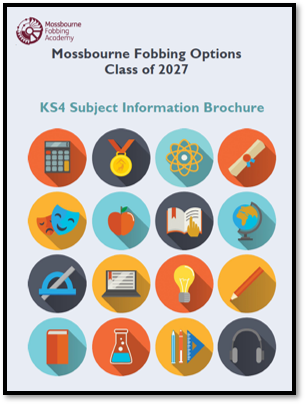Option Choices
Key Stage 4 Options
Welcome to our Key Stage 4 (KS4) Options Web Page. The resources presented here are tailored to assist students and parents/carers during this thrilling phase of the learning journey. This pivotal juncture offers the opportunity to select subjects that will shape your/your child's educational path in years 10 and 11. We urge you to carefully peruse the Information Brochure as the insights they provide will prove invaluable in making these significant choices.
At Mossbourne Fobbing Academy, we acknowledge the significance of offering unwavering support as your child embarks on the journey of selecting options that will define their path in the upcoming stage of their academic voyage. The options process is meticulously designed to offer the framework, counsel, and direction required to make well-informed decisions about the courses to be pursued.
| Subject Information Brochure |
 |
Empowering Your Future: Navigating Year 9 Curriculum Choices
Embarking on curriculum decisions in Year 9 marks a significant chapter in your school journey. This moment is an opportunity for you to seize control of your education, sculpting a path towards the future you envision. The choices you make now, for Years 10 and 11, will shape your school experience over the next two years and potentially impact your course or training options post-Year 11.
Selecting subjects aligned with your interests and passions is paramount. Dedicate time to reflect on what truly engages you, what keeps your curiosity ignited, and what propels you to excel. Importantly, recognise that you're not alone in this decision-making process; your Year 9 peers are on the same journey. Teachers, friends, parents, carers, and family members are poised to provide the guidance, counsel, and support you need during this crucial phase.
In today's educational landscape, pupils continue their educational journey or training until the age of 18. This commitment entails remaining in school, attending college, or engaging in employment with appropriate training until July 2027. Beyond that horizon, many students aspire to pursue university degrees or higher/degree-level apprenticeships in college or university.
Your planning should extend beyond the confines of GCSE's. Many of you are eyeing university education or aiming for degree apprenticeships, which underscores the importance of being aware of subjects that might be expected at GCSE and A Level. Some universities may favour a Modern Foreign Language along with Geography or History at GCSE. The 'Informed Choices' website amalgamates guidance from Russell Group university admissions teams, offering clear insights into subjects recommended for competitive university pathways.
For further exploration, you can access degree apprenticeship listings on the national 'find an apprenticeship' website, delving into subject-specific requisites for opportunities at this level. Additionally, leverage your personal log-in to search for degree courses and apprenticeships on Unifrog, uncovering entry requirements, including mandatory subjects.
Peruse the Subject Information Brochure available on the school's website for an enriched understanding of your options. Your future is a tapestry of your choices, and Mossbourne Fobbing Academy is here to guide you every step of the way.
Guidance for Students: Crafting a Well-Rounded Curriculum
Our recommendation for students is to cultivate a diverse and harmonious array of subjects, thereby safeguarding open avenues for future endeavours. While career aspirations and personal passions hold significance, our belief rests in the idea that success often blossoms when students opt for subjects they genuinely relish and ardently engage with.
Simultaneously, we ardently advocate for students to select subjects that contribute to achieving the English Baccalaureate (EBAC) upon completing the two-year journey. This accomplishment stands as a testament to a well-rounded education and is highly regarded in various educational and professional contexts.


